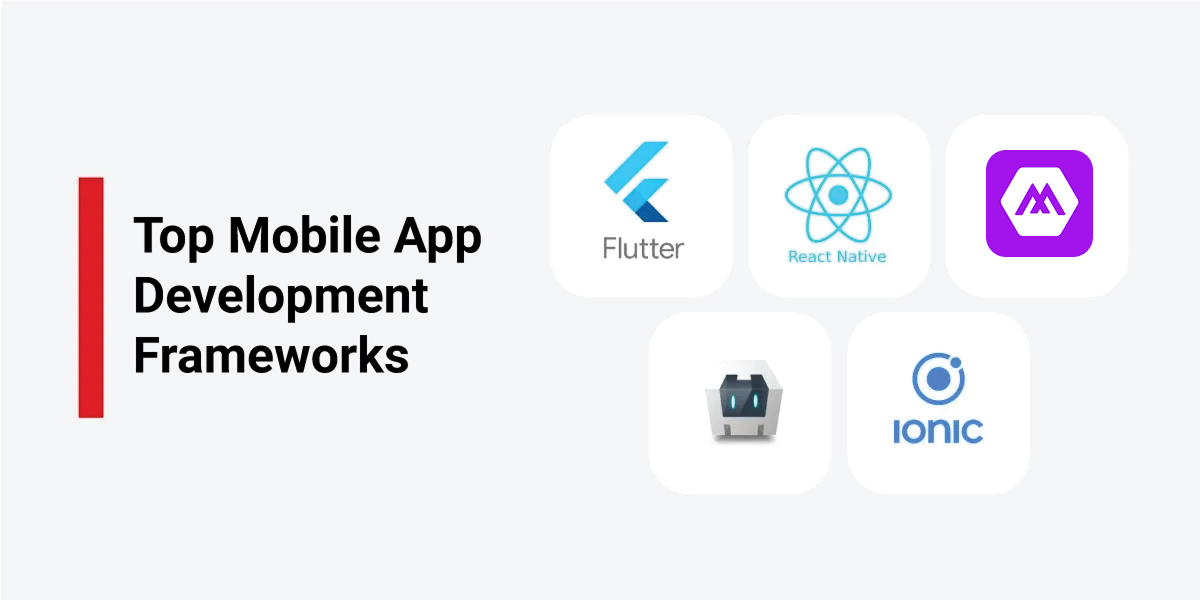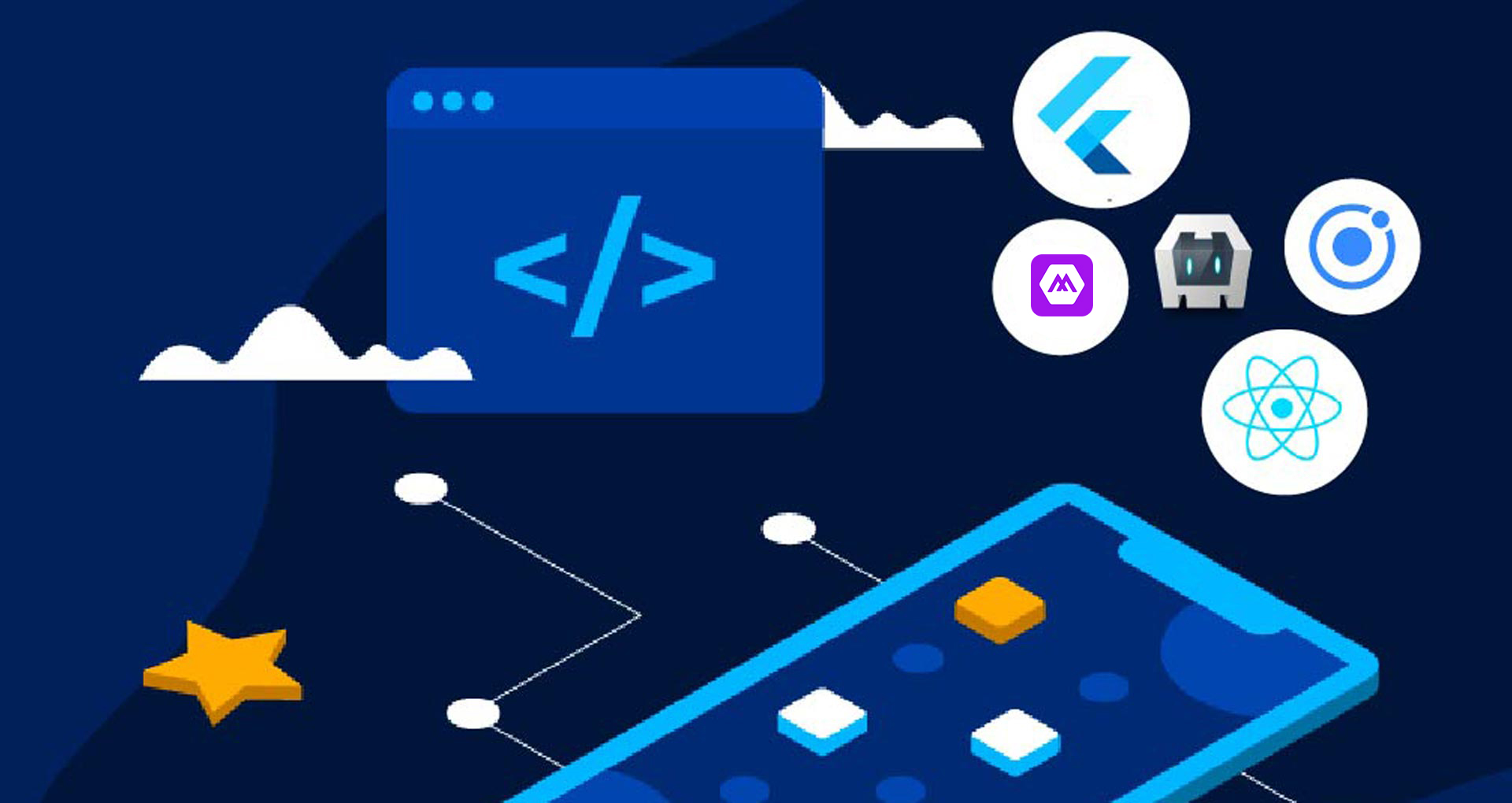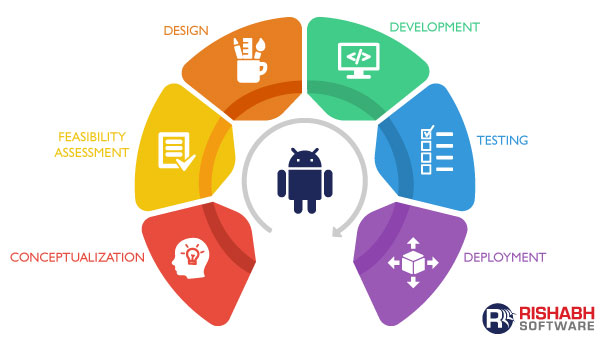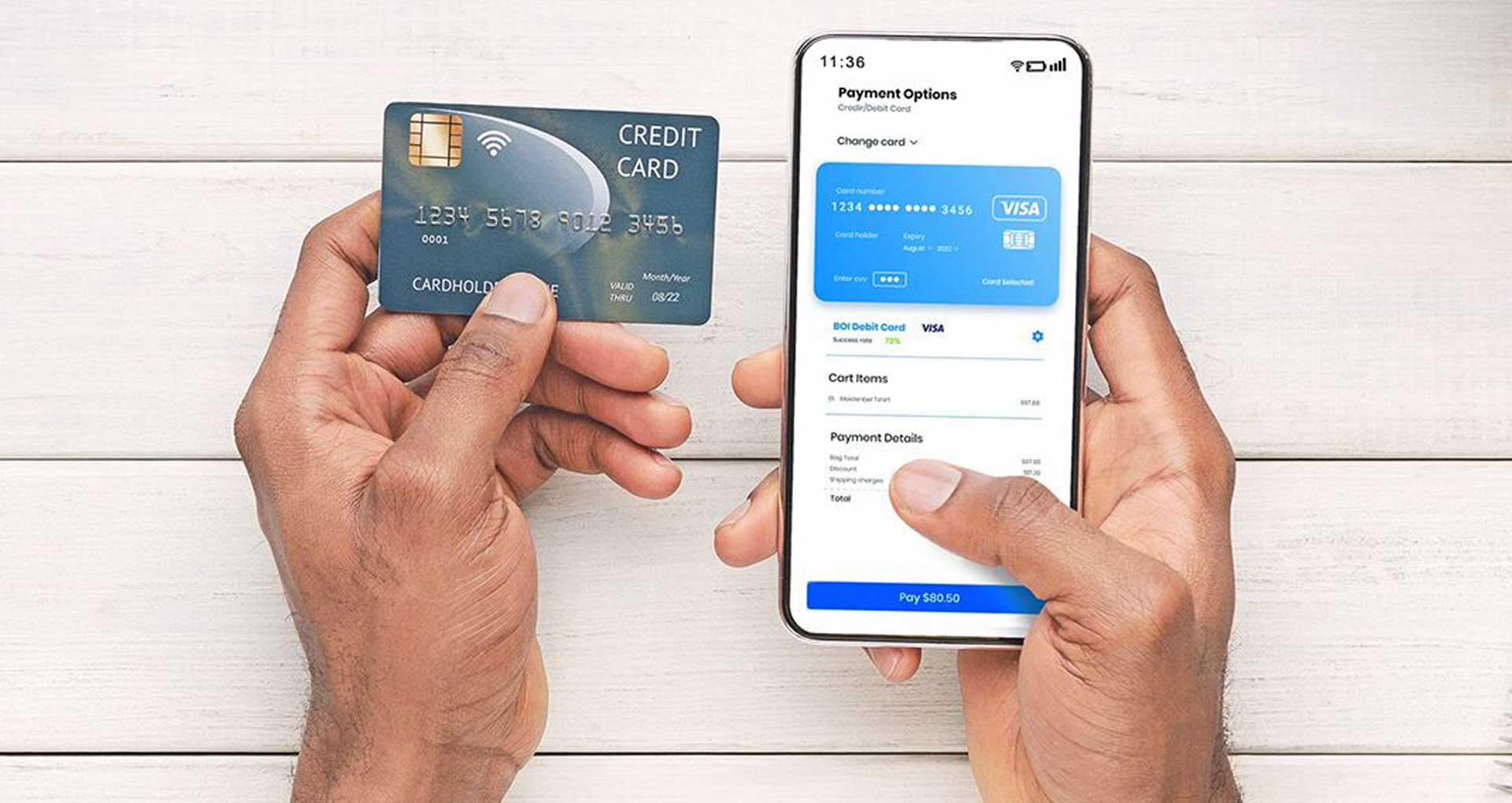Mobile app development has become an integral part of modern businesses, enabling them to engage with customers and increase their reach. With the increasing demand for mobile apps, there is a growing need for efficient and effective mobile app development frameworks like .NET MAUI, Flutter, React Native & more. They help development teams to create apps faster and with less complexity. And different frameworks offer varied benefits and have specific shortcomings. With a gamut of frameworks available, choosing the right option is critical to ensure the success of your mobile app development initiative.
In this blog post, we will explore some popular mobile app development frameworks businesses can use to build high-quality mobile apps for their customers. We will discuss the varied frameworks, their comparison & the benefits each of them offers. It would enable an informed decision when choosing the proper framework for your mobile app development needs.
What are Mobile App Development Frameworks?
Mobile app development frameworks are tools, libraries, and components development teams use to build mobile applications. These frameworks provide a structure to work within and help them create mobile apps more efficiently. They reduce the amount of repetitive work and allow the teams to focus on the unique aspects of their application.
Types Of Mobile Apps Development Frameworks:
- Native Mobile Application Development Frameworks: These are platform-specific frameworks for iOS & Android platforms. They utilize native tools and programming languages like Java (Android) and Swift (iOS). They are developed using platform-specific programming languages like Java or Kotlin for Android and Swift or Objective-C for iOS. Examples of native frameworks include Xcode for iOS, Android Studio for Android, and .Net Framework with C# for Windows.
- Hybrid Mobile Application Development Frameworks: This framework utilizes web technologies such as HTML, CSS & JavaScript to create mobile apps that can operate on multiple platforms. The developed apps are cost-effective, fast to deploy, and perform well but may suffer from performance issues. Examples of hybrid frameworks include Ionic, AngularJS, jQuery Mobile, Sencha Touch & more
- Cross-platform Mobile Application Development Frameworks: They employ a single codebase to build mobile apps that run efficiently on multiple platforms. They balance native and hybrid frameworks when it comes to performance and development time. Examples of cross-platform frameworks include .NET MAUI (Evolution of Xamarin), Flutter, React Native, Kotlin & more.
- Low-Code/No-Code Frameworks: Low-code/no-code frameworks enable developers to create mobile apps with minimal coding experience or even without coding. They use drag-and-drop interfaces and pre-built components to build apps quickly. Examples of low-code/no-code frameworks include Power Apps, AppSheet, Mendix, Bubble, Glide & more.
Top Mobile App Development Frameworks
Let’s take a closer look at some of the most popular mobile development frameworks available today, their features, and how they can benefit app developers. Whether you’re an established business or a start-up, this guide will help you choose the best framework for your mobile app development needs.

.NET MAUI
Microsoft introduced .NET MAUI as the next evolution of Xamarin for cross-platform development. It is built on Xamarin.Forms and supports desktop platforms as well. Developers can use a unified codebase to build xAndroid, iOS, macOS, and Windows applications.
Key Features of .NET MAUI:
- Developers can write a single codebase that works across Android, iOS, macOS, and Windows which also makes maintenance and deployment faster and easier.
- Developers can use a unified project structure to keep all platform-specific code and resources together and drive a swift and simplified development process.
- Apps built using .NET MAUI compile native code to deliver native performance while ensuring they run as fast as apps built specifically for each platform.
- Developers can employ modern UI controls to create responsive, adaptive interfaces that look great on any device, with multiple options for designing stunning visual layouts.
- Developers can easily tap into native APIs and access platform-specific features to fully utilize device capabilities.
- Smooth integration with other .NET technologies enhances the overall app functionality.
Examples of Applications Built Using .NET MAUI:
- Stack Overflow
- DevExpress
- Microsoft Teams (Desktop version)
- Visual Studio for Mac
When Should You Consider Using .NET MAUI?
Opt for .NET MAUI if:
- You require native performance and access to platform-specific APIs.
- You aim to target multiple platforms with a single codebase.
- You prefer a unified project structure to manage your application.
Learn more about our .NET MAUI App Development Services to build dynamic mobile and desktop applications with reusable code, modular architecture, and seamless integration with the .NET ecosystem.
Flutter
Flutter is a free and open framework released by Google in 2018. It helps build native-like Android and iOS mobile apps and web and desktop applications using a simple codebase. It is a highly dependable smartphone UI framework. It has a layered architecture that renders components faster.
It was written in the modern programming language Dart and its underlying graphics framework. Further, the Dart virtual machine was implemented in C and C++. This precise and comprehensive framework contains a mobile-first 2D rendering engine, debugging & integrating APIs, and other resources to develop mobile apps.
Features of Flutter:
- Hot Reload: allows developers to see the changes made in the code immediately in the app without restarting the app
- Use of Widgets: Serve as the building blocks of the UI, and they can be easily customized and combined to create complex UI elements.
- Native Feature Access – Accessibility to native features such as camera, GPS, and contacts
- Material Design & Cupertino widgets to build apps that look and feel like native Android and iOS apps
- Fast Deployment cycle with the ability to use a single codebase across both Android & iOS platforms enables development teams to save time and effort
Examples of apps built using Flutter:
- Abbey Road Studios
- Cryptograph
- Alibaba
- Hamilton
- Google Ads
- Reflectly
- eBay Motors
- PostMuse
- Google Pay
When should you use Flutter?
You must utilize the Flutter framework to create your mobile app if:
- Your business needs a cross-platform app,
- You require excellent UI,
- You want to create visuals quickly and easily,
- You want to utilize several customizable widgets.
Learn more about our Flutter App Development Services that enable growing organizations to build highly functional applications with native performance and expressive and flexible UI.
React Native
React Native helps develop native iOS, Android, and web apps using React, a JavaScript library that builds User Interfaces. Facebook (Now Meta) created and presented this open-source, cross-platform framework to the world in 2015.
It provides fast and consistent development of intuitive, rich, amazing apps and a more rapid deployment time. It is written in JavaScript and combines the best of React.JS and JavaScript to allow writing modules in Swift, Objective-C, or Java languages. It has a significant development community and many repositories.
Features of React Native:
- Cross-Platform Development
- Native Performance
- Hot Reloading
- Use of Flexbox Layout to build mobile app interfaces while making it easy for developers to create responsive and adaptive UIs
- Powerful Debugging Tools
- Support for Third-Party Libraries like Ionic Native, Redux, MobX and more, leading to simple migration
- Declarative API for predictive UI and other high-level APIs
- Faster time-to-market with short development time
- Reusable UI components and codes, making it low-code
- Component-based GUI creation for front-end apps
- Easy maintenance
Examples of apps built using React Native:
- Flipkart
- Soundcloud
- Shopify
- Airbnb
- Skype
- Airbnb
- UberEats
- Amazon Prime
- Tesla
When should you use React Native?
You must utilize React Native framework to create your mobile app if:
- Your business needs cross-platform application development,
- You want faster go-to-market,
- You expect to get a responsive mobile application,
- You don’t want to customize UI, and
Learn more about our React Native App Development Services to build dynamic mobile apps with reusable code, modular architecture, JavaScript components, and fast refresh capabilities.
Apache Cordova
Apache Cordova, previously called PhoneGap, helps build hybrid mobile apps using web technologies like HTML, CSS, and JavaScript for Android, iOS, and Windows platforms. This open-source framework, backed by a large community, is based on JavaScript, CSS3, and HTML5. It is a developer-friendly framework with many plugins, making adding app functionality easier.
Features of Apache Cordova:
- Uses a single code base for multiple platforms
- Plugins to access device hardware like GPS, camera,
- Command-Line Interface (CLI)
- Access to native APIs of numerous devices
- Capabilities and support for offline usage
- Ability to provide a Cloud solution
Examples of apps built using Apache Cordova:
- Uptappd
- Localeur
- SparkChess
When should you use Apache Cordova?
You must utilize the Apache Cordova framework to create your mobile app if:
- You need a cross-platform mobile application,
- Your app requires access to many functions and hardware of devices like smartphones, tablets and more
Ionic
Ionic is an open-source and free framework that helps build cross-platform mobile apps for iOS, Android, and Windows, as well as dynamic and hybrid Progressive Web Applications (PWAs). Apps developed using Ionic are native-like, interactive, feature-rich, and high-performance. It is based on Apache Cordova and Angular or Vue or Reach and supports the JavaScript programming language and its frameworks.
Ionic offers many UI components and plugins, making app development & shipping faster and easier. It is compatible with many front-end frameworks and libraries like Angular, React.js, Vue.js & more. It allows the application design to use UI elements like forms, filters, views, action sheets, tab bars, and navigation menus to make it user-friendly and inventive.
Features of Ionic:
- Intuitive mobile-optimized UI components and WebViews
- Adaptive styling
- Command-line interface (CLI) for developing and testing applications
- Complete control over application development
- Capacitor and Apache Cordova plugins help access device in-build functionalities like camera, Bluetooth, audio-recorder, GPS, flashlight, etc.
- High-level documentation
- Utilizes many JavaScript components, including more than 100 for Angular
- Provides many features and themes like lazy loading, touch-optimized gestures, pre-rendering, Ahead-of-time (AOT) compiling, etc.
Examples of apps built using Ionic:
- T-Mobile
- Instant Pot
- Firstly
- GE Transportation
- ChefSteps
- Market Watch
- DieselOn
- Amtrak
- BBC
- Sworkit
- EA Games
When should you use Ionic?
You must utilize the Ionic framework to create your mobile app if:
- Your business needs a highly interactive app for iOS and Android,
- You need a Progressive Web Application,
- Your developers are proficient with JavaScript, HTML, and CSS
Benefits of Mobile App Development Frameworks
Frameworks support mobile app development and provide a fundamental structure for a specific environment. Using them increases app reliability, accelerates development, and simplifies testing.
Let’s look at some other benefits of mobile app development frameworks:
- Cost-Effective Solution: As app development frameworks provide time and resource savings, reduce development and shipping time, ensure reliable development, and offer better features, they provide a cost-effective solution. They are compatible with varied programming languages and frameworks and provide built-in features that save time and resources in app development.
- Cross-Platform Compatibility: Hybrid or cross-platform frameworks help build apps for Android & iOS platforms that are compatible with IoT devices & Progressive Web Apps.
- Leverage Better Functionalities: Mobile development frameworks provide easy integration with numerous tools, APIs & libraries, allowing developers to utilize high-level capabilities and features without writing complex code.
- Improved Security: Many mobile app development frameworks provide robust security features, including encryption and secure communication protocols, to ensure that mobile apps are safe and protected.
- Access to Native Features: Many mobile app development frameworks provide access to native features such as cameras, GPS, and contacts seamlessly.
Mobile App Development Frameworks Comparison
Let’s find out how the top mobile app development frameworks fare on varied parameters and compare them.
.NET MAUI
- Can build apps: iOS, Android, Windows, macOS
- Programming language: C#
- UI/UX: Fully native adaptive
- Performance: High
- Development and Testing: Hot reload, efficient tooling
- Time-to-market and cost: Quick deployment, cost-effective
- Community Support: Rapidly growing
Flutter
- Can build apps: iOS, Android, Web
- Programming language: Dart
- UI/UX: Adapts to platforms
- Performance- High
- Development and testing: Supports live reload, Fast
- Time-to-market and cost: Faster and cheaper
- Community support: Popular
React Native
- Can build apps: iOS, Android, Web
- Programming language: JavaScript
- UI/UX: Adapts to platforms
- Performance: High
- Development and testing: Average
- Time-to-market and cost: Faster and cheaper
- Community support: Popular
Apache Cordova
- Can build apps: iOS, Android, Web
- Programming language: JavaScript
- UI/UX: Adapts to platforms
- Performance: Low
- Development and Testing: Supports live reload, Fast
- Time-to-market and cost: Faster and cheaper
- Community Support: Not so popular
Ionic
- Can build apps: iOS, Android, Web
- Programming language: JavaScript
- UI/UX: Adapts to platforms
- Performance: Low
- Development and testing: Average
- Time-to-market and cost: Faster and cheaper
- Community support: Not so popular
Why Partner with Rishabh Software for Mobile App Development?
We have designed, developed, and modernized mobile applications for companies of all sizes, from start-ups to enterprises & across varied industries like finance, healthcare & more. Our mobile app development services include creating native & cross-platform apps, along with mobile app integration, migration, and modernization.
We have a highly proficient and dedicated team of mobile developers, UI/UX designers & testers who adhere to the best practices and adopt agile methodologies to deliver high-quality apps on time that meet varied business needs. They leverage a versatile tech stack and top mobile app development frameworks, including .NET MAUI Flutter, React Native, and more, to ensure you get the best ROI (Return on Investment) for your app development project.
Our Success Stories:
Case Study 1: Online Event Ticket Reservation App

A New Zealand-based event ticketing company wanted a platform to manage ticket bookings for multiple events with a smart scanning interface that could verify and validate the enrolment of tickets. They also wanted to get accurate reports from attendees and registrants. Our team engineered an event ticket booking mobile platform utilizing one of the best frameworks for mobile app development React Native.
Key takeaways;
- 10,000+ concurrent bookings across multiple events during the busy hours
- 60% rise in ticket bookings and confirmations, thanks to enhanced UI
- No duplicate bookings or ticket overselling
Learn how the developed Event Ticket Booking Mobile App helped the client.
Case Study 2: Gas Cylinder Distribution & Tracking System
A French gas distribution giant wanted a mobile-first gas cylinder management application to monitor vehicles and cylinders’ movement between the plant and refilling depot to optimize the supply chain network. Our team utilized one of the most popular mobile development frameworks, Xamarin and Bluetooth Low Energy (BLE) Beacon, to build a gas cylinder tracking system to deliver real-time 360-degree visibility of vehicles and cylinders.
Key takeaways;
- 40% acceleration in the gas cylinder delivery process
- 46% enhancement in inventory control and accuracy of order workflow
- 4x improvement in driver proficiency while handling multiple orders
Learn how the Real-time Gas Cylinder Distribution Tracking System helped the client.
Concluding Thoughts
Mobile app development frameworks enable development teams with the required tools & resources to build mobile applications quickly and efficiently. With cross-platform development, native performance, rapid growth, access to native features, simplified maintenance, and a large community of developers, these frameworks have become essential to mobile app development. They make the application creation process fast, easy, and simple.
Whether you are a business looking to build a mobile app or a developer looking for a more efficient way to build mobile apps, mobile app development frameworks offer numerous benefits that can help you achieve your goals. With the continuous development and improvements in these frameworks, we can expect to see even more innovative and advanced features in the future, further driving the growth of the mobile app industry. You could partner with an experienced and proficient mobile app development company offering a wide range of services to ensure the development of a mobile application that meets your business needs and expectations.
Frequently Asked Questions
How to choose the right mobile app development framework?
Listed below are a few elements to consider when selecting the right one you’re your business from the best frameworks for mobile app development:
- Features: Based on your business requirements for user experience and app features. Select the best mobile app framework to build unique features and provide cross-platform support (if you are building a hybrid app).
- Development Cost: While native app development usually costs more than cross-platform development, comparing and considering the cost before commencing your project is better.
- Support For Devices: Be it Android, iOS, or Windows, your app’s devices need support. You must choose the development framework to ensure your mobile application is compatible with all your target platforms.
Are mobile app development frameworks suitable for all types of mobile apps?
They are suitable for various mobile apps, from simple informational apps to complex enterprise-grade apps. However, some apps may require more customization or access to specific native features unavailable in all frameworks.








